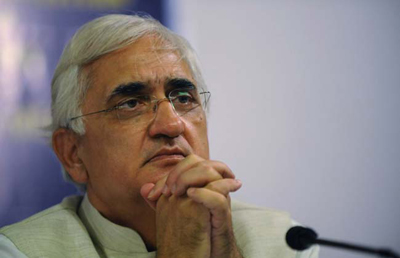
New Delhi, November 25: Notwithstanding the bitterness between the Congress and its estranged ally Trinamool Congress, External Affairs Minister Salman Khurshid has reached out to Mamata Banerjee’s party to seek its support on a proposed bill to amend the Constitution for ratification of a boundary deal between India and Bangladesh.
Though Banerjee and her government in West Bengal are believed to have reservations over the additional protocol that New Delhi and Dhaka last year agreed to add to the 1974 Land Boundary Agreement, Khurshid offered to arrange a briefing by the Ministry of External Affairs for the Trinamool Congress MPs in Rajya Sabha and Lok Sabha.
The Congress-led United Progressive Alliance Government also sought help from the Bharatiya Janata Party for the passage of the proposed bill for amendment of the Constitution by both Houses of Parliament. But the principal opposition party is likely to oppose the ratification of the deal since it had earlier joined the clamour against it in Assam, which, like West Bengal, also has a stretch of the 4,096.70 km-long India-Bangladesh border.
The External Affairs Minister wrote to the chairman of the Trinamool Congress Parliamentary Group, Mukul Roy, pointing out that the implementation of the 1974 Land Boundary Agreement and its additional protocol would “result in better management and coordination of the border and strengthening” India’s efforts to deal with smuggling and other crimes across the country’s border with Bangladesh.
Khurshid reminded Roy that the Centre obtained “written concurrence of the state governments concerned” before signing the additional protocol to Land Boundary Agreement with Bangladesh.
The protocol was signed during Prime Minister Manmohan Singh’s visit to Dhaka on September 6 and 7 last year. It seeks to resolve pending disputes on un-demarcated stretches, facilitate exchange of 111 Indian enclaves in Bangladesh with 51 Bangladesh enclaves in India and preserve status quo on territories in adversely possessed land.
“Since the proposal of exchange of enclaves and redrawing of boundary involves transfer of territories, it requires an Amendment to the Constitution,” wrote Khurshid.
Sources told Deccan Herald that the government was keen to introduce the bill to amend the Constitution in Parliament soon, since New Delhi wanted to send out a message to Dhaka that Singh’s Government was committed to ratifying both the 1974 deal and its additional protocol.
Singh is understood to have taken up the issue with BJP top brass L K Advani, Sushma Swaraj and Arun Jaitley during the dinner he hosted for them last Thursday. Sources, however, said that the BJP troika had refused to commit the party’s support to the government for passage of the bill.
Troubled ties
Trinamool Congress’ troubled ties with Congress worsened after Banerjee pulled out of the prime minister’s entourage to Dhaka in September 2011, because she had reservations over the proposed India-Bangladesh agreement for sharing of the water of common river Teesta. New Delhi put the deal on Teesta on the backburner, but signed the protocol to the Land Boundary Agreement with Dhaka during the prime minister’s visit to Bangladesh. The chief ministers of northeastern states having stretches of India-Bangladesh border accompanied Singh.
The deal however triggered protests from social organisations and political parties in Assam and Meghalaya, as it was alleged that the new protocol added to the boundary deal would make the States lose territories to Bangladesh.
The government needs two-third majority in both the Houses to get any constitutional amendment bill passed and the UPA at present does not have the support of enough MPs.






Comments
Add new comment